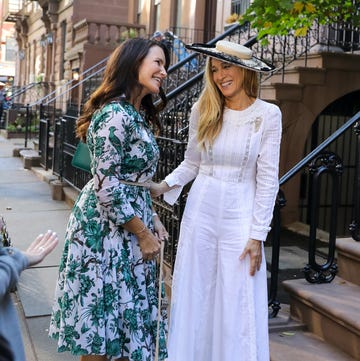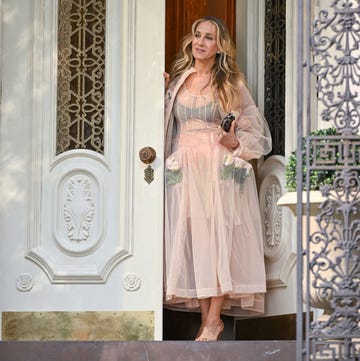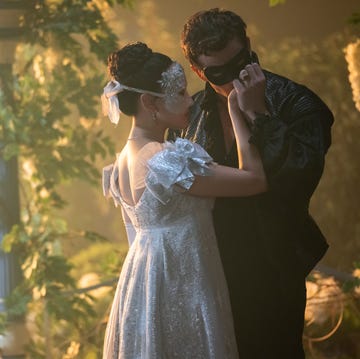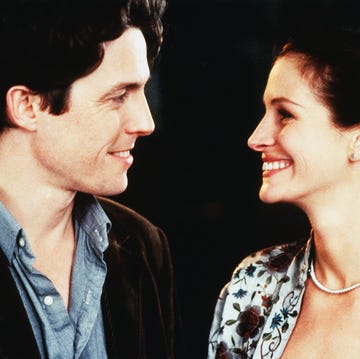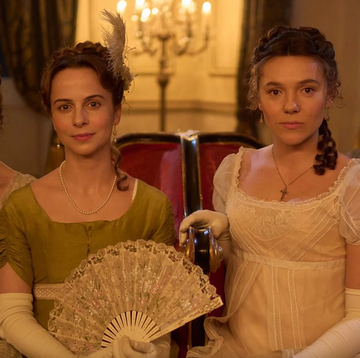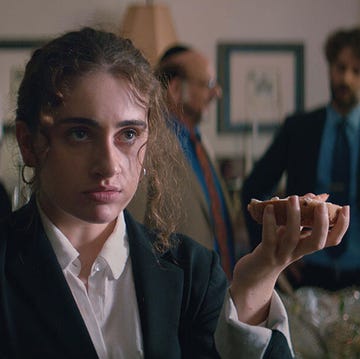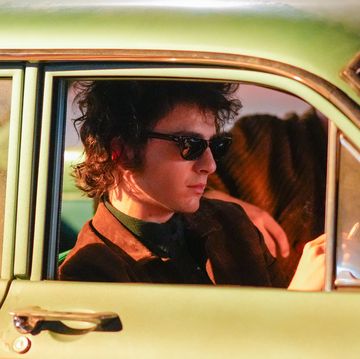There was something in the air that day: the atmosphere shimmered as golden shards of late-afternoon sun cast down on Wembley Stadium on the final leg of Taylor Swift’s Eras tour. The crowd’s excitement was hard to quieten. That was until the voice of the opening act, Raye, filled the space: a voice so commanding that audiences don’t just listen to her performances, they feel them in their bones.
A few weeks after that night, when I had sat, goose-bumped, watching Raye, I join her (via videocall) in the back of a car weaving through the cobbled streets of Milan. “Everything that’s happened this year isn’t a normal experience,” she says, laughing. “I’ve ticked some really big dreams off my list. It’s been bonkers and beautiful, but it’s about taking some time to be able to digest all of that.” These high points include her sweep at this year’s Brits – the 27-year-old won six out of the seven awards she was nominated for, breaking the record for the most trophies handed out to an artist in one night in the ceremony’s history. Later, she was a musical guest on Saturday Night Live, and accepted Swift’s invitation to join her at the big- gest concert of the year (with Swift shouting out on stage, to her 90,000-strong audience, how huge a fan she is, calling Raye an “absolute superstar”.) The rest of her summer was spent touring the globe, switching between playing to crowds at Swiss jazz events to fresh-out-of-school teens at Leeds Festival. “It’s so beautiful to have feedback from so many different types of people,” she says.
Her success may seem as though it happened overnight; yet it was anything but. Raye grew up as Rachel Keen in south London (where she still lives) and shortened her name for the stage. Her talent was recognised, and she was signed to Polydor Records aged 17. There, she grafted seven days a week, writing songs for Beyoncé and John Legend, but never for herself. She waited for the label to give her the go-ahead to release her own work. In 2021, fearing that day would never come and thinking that she’d have to continually channel her talent towards the success of others, Raye tweeted her frustration, saying that she was “done being a polite pop star”. As a result, Polydor let her go; instead of giving up, she independently funded her debut album My 21st Century Blues, which, across 14 tracks, lays bare the intricacies of her toughest moments, including her substance abuse, body dysmorphia and sexual assault. “Having been an artist who, for so long, wasn’t able to express myself candidly, I now feel obliged to chapter my life this way,” she says. The album spans a variety of genres, from jazz to R&B, and recounts experiences that are uniquely Raye’s, but also tug at the universal realities of young womanhood. It took a while to understand what my consent means/If I was ruthless, they’d be in the penitentiary [...] I pushed it down but it was livin’ in me rent-free/And then I fell into some things that were unhealthy/ A place where no one heard me asking them to help me, help me, she sings on “Ice Cream Man”, lyrics so raw she often breaks down when performing them on stage.
Yet there is catharsis to reliving her hardest moments. “I feel so safe inside my music,” she says. “When I’m writing, I just have to be in the process, and express. Then it’s the separate thing of singing those words. Sometimes, that’s tough... but it heals me. I’m just trying to be as honest as I can.”
So much of her work seamlessly blends the personal with the political, something showcased in her latest single “Genesis”, a seven-minute song on which she reflects on everything from the low wages in the NHS to social media. She has now completely reconsidered her usage of the latter: “I’ve had to change my password [to her social-media accounts]. I now have someone who is logged in on their phone, where I can check in and look at it. I’ll do 10 minutes, but even that can get to you,” she says. “I think it’s something we have to look at in the same way as sugar – we need to put measures in place for our health.” Her music, she feels, is a way to hold a mirror up to society. “It’s always evolving, and we’re still glazing over some stuff. We take one step forward and one step back.”
Throughout our conversation, Raye chats as though we’ve known one another for years; she laughs easily and doesn’t have the same guard up as many others in the limelight (understandably) do. But those in the industry should not be fooled. This is a star who knows exactly where her boundaries are – her response to Polydor and the decision to go independent is testament to that. She’s now managed by her parents and her time is carefully guarded; her songs are where she processes her trauma, but she’s not going to make the finer details available to the public.
“The greatest advice I can give any artist is to have creative freedom,” she says. “To feel free to call the shots.” It’s this firm yet politely rebellious side that makes Raye’s success seem even more victorious. She paves the way for a new wave of female artists who stand against the idea that you have to destroy yourself in order to make it in the music industry. No wonder Taylor Swift is a fan.




